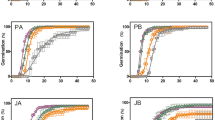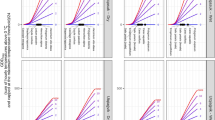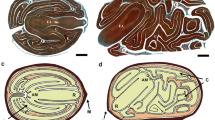Abstract
DIURNAL fluctuations in temperature may initiate or accelerate germination in certain flowering plants1–6, and the effectiveness of the stimulus varies according to the amplitude of fluctuation7 and the presence or absence of light8. Attempts3,6 to assess the adaptive significance of the phenomenon, however, have been limited by the scarcity of data for species of contrasted ecology. We report here an investigation of germination responses to fluctuating temperatures, conducted on seeds of herbaceous species collected from native populations near Sheffield. The results suggest that requirements for diurnal fluctuations in temperature are characteristic of the germination of species from particular types of habitat and provide mechanisms which cause seeds to germinate at times and in places favourable for seedling establishment.
This is a preview of subscription content, access via your institution
Access options
Subscribe to this journal
Receive 51 print issues and online access
$199.00 per year
only $3.90 per issue
Buy this article
- Purchase on Springer Link
- Instant access to full article PDF
Prices may be subject to local taxes which are calculated during checkout
Similar content being viewed by others
References
Morinaga, T. Am. J. Bot. 13, 141–158 (1926).
Warington, K. J. Ecol. 24, 185–204 (1936).
Cavers, P. B. & Harper, J. L. J. Ecol. 54, 307–382 (1966).
Thompson, P. A. J. exp. Bot. 20, 1–11 (1968).
Thompson, P. A. J. exp. Bot. 25, 156–163 (1974).
Thompson, P. A. J. exp. Bot. 26, 164–175 (1974).
Grime, J. P. & Thompson, K. Ann. Bot. 40, 795–799 (1976).
Toole, V. K. & Borthwick, H. A. J. Am. Soc. Hort. Sci. 93(3), 301–304 (1971).
Haldall, P. & French, C. S. Pl. Physiol. 33, 249–252 (1958).
Clapham, A. R., Tutin, T. G. & Warburg, E. F., 2nd ed. Flora of the British Isles (1962).
Kershaw, K. A. J. Ecol. 46, 571–592 (1958).
Milnethorpe, F. L. Mechanisms in Biological Competition 342 (Cambridge University Press, 1961).
Rorison, I. H. J. Ecol. 48, 585–599 (1960).
Wardle, P. J. Ecol. 47, 483–497 (1959).
Champness, S. S. & Morris, K. J. Ecol. 36, 149–173 (1948).
Chippendale, H. G. & Milton, W. E. J. J. Ecol. 22, 508–531 (1934).
Roberts, H. A. Rep. natn. Veg. Res. Stn. 25–38 (1969).
Sarukhan, J. J. Ecol. 62, 151–177 (1974).
Strickler, G. S. & Edgerton, P. J. Ecology 57, 801–807 (1976).
Wesson, G. & Wareing, P. F. J. exp. Bot. 20, 402–413 (1969).
Author information
Authors and Affiliations
Rights and permissions
About this article
Cite this article
THOMPSON, K., GRIME, J. & MASON, G. Seed germination in response to diurnal fluctuations of temperature. Nature 267, 147–149 (1977). https://doi.org/10.1038/267147a0
Received:
Accepted:
Issue Date:
DOI: https://doi.org/10.1038/267147a0
This article is cited by
-
Warming impacts potential germination of non-native plants on the Antarctic Peninsula
Communications Biology (2021)
-
Effects of temperature on germination in eight Western Australian herbaceous species
Folia Geobotanica (2019)
-
Environmental factors influencing fruit production and seed biology of the critically endangered Persoonia pauciflora (Proteaceae)
Folia Geobotanica (2019)
-
Macro- and microclimate conditions may alter grapevine deacclimation: variation in thermal amplitude in two contrasting wine regions from North and South America
International Journal of Biometeorology (2017)
-
Overexpression of OsmiR156k leads to reduced tolerance to cold stress in rice (Oryza Sativa)
Molecular Breeding (2015)
Comments
By submitting a comment you agree to abide by our Terms and Community Guidelines. If you find something abusive or that does not comply with our terms or guidelines please flag it as inappropriate.



